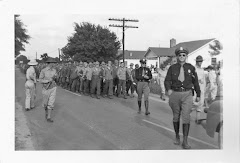I am pleased to post below a review of Guests Behind the Barbed Wire that appeared this morning on amazon.com. It is written by the daughter of Jack Sisty, one of several guards at Camp Aliceville who fell in love with and married young women in the Pickens County area and later returned to Aliceville to make their home:
A Daughter of the Camp, December 30, 2007 I grew up in Aliceville, Alabama, and enjoyed almost idyllic childhood and teenage years there. I am a product of Camp Aliceville. My father was a native of Long Island, New York. He tried many times to enlist in the Army at the beginning of the war, but was turned down because he had a permanent limp from polio as an infant and a ruptured eardrum. Finally, he was allowed to enlist and was sent directly to Aliceville, Alabama, a GI at the prisoner of war camp. There he met my mother, a member of an old family in the area, who was one of the many young women who left their jobs to work at the camp; it was an exciting time for them, a chance to do something completely unexpected, and a chance to serve their country. My Mom and Dad met, courted, and married on one of my Dad's three-day passes. They lived briefly in New York, where my brother and I were born, then moved back to Alabama, to stay. I grew up listening to stories about the camp. Until recently, the history of Camp Aliceville has been largely unknown to the rest of the country. It is wonderful that more people will be made aware of the happenings there, thanks to Ms. Cook and her excellently researched and well-written book. Aliceville became richer because of the influx of GI's from all over the country, many who remained in Aliceville after the war. Aliceville became rich in culture and history, and its citizens developed a great appreciation for the arts and literature. Above all, Aliceville did exhibit a great example of the Golden Rule. It is to our credit that POW's were treated humanely and with respect - things that did not always happen in countries where our veterans were held as prisoners.
Subscribe to:
Post Comments (Atom)






1 comment:
Magazine The Memory of Our People
Rosario, Argentina.
Year IV, Number 40/41
revistalamemoria@yahoo.com.ar
Summary:
The forms of the state in Argentina, by Ronen Man. School of History. Faculty of Humanities and Arts at the National University of Rosario.
The contentious relationship between the city of Rosario and a belgian holding tramway, by Fernando Cesaretti and Florencia Pagni. School of History. Faculty of Humanities and Arts at the National University of Rosario.
Artistic manifestations of the death in the Middle Ages, by Angela Trinidad Tuttolomondo. School of History. Faculty of Humanities and Arts at the National University of Rosario.
How we conceived the historical facts, 1st part, by Maximiliano Rodriguez. School of History. Faculty of Humanities and Arts at the National University of Rosario.
The last “sapucay”, by Raul María Callegari. School of History. Faculty of Humanities and Arts at the National University of Rosario.
Small tribute to the blood spilled by those who only had left to fight for the honor..., by Adriana Acosta Sosa. Faculty of Law at the National University of Northeast.
Another explanation of the migration reality between Mexico and the United States, by Horacio Yubone. School of Anthropology. Faculty of Humanities and Arts at the National University of Rosario.
Militants of the Revolutionary Peronism, by Roberto Baschetti. School of Sociology. University of Salvador.
Debt, justice, fictions, by Oscar Sbarra Mitre. Faculty of Economics at the University of Buenos Aires.
Review of the book "The companions. Workers left and Peronism" of
Alexander Schneider, by Facundo Cersósimo. Department of History. Faculty of Arts at the University of Buenos Aires.
The easiest and most practical way to accede to the magazine is to transact
its shipment and buys by electronic mail, to the following e-mails:
ifiscella@corpuslibros.com.ar, rosario@corpuslibros.com.ar or
capital@corpuslibros.com.ar
You are invited to write with absolute thematic and opinion freedom. We suggest for space reasons and design of the magazine, that the article does
not exceed the 20,000 characters, although this is not excluding condition (if your work is of greater size, can be published by deliveries).
When you send it to revistalamemoria@yahoo.com.ar please also send, in an attached file, your personal photo, an e-mail direction where you prefer to receive commentaries of the readers on your notes, and the academic and/or labor references (a very synthetic personal CV), everything which will constitute, at the foot of the article, your author data.
STAFF:
Director and General Editor: architect Daniel Alberto Zarate;
Editorial Board: engineer surveyor Esteban Mestre, anthropologist Humberto Vial Sotomayor, psychologist Walter Iampietro, historian Norberto "Otto" Gonzalez;
Advisory Council: Adriana Natalini, Anabella Arpresella, architect Fabian Fabre, Emiliano Valentino, historian Gabriela Chavez, sociological Marcelo Guirado, degree in Political Sciences Esteban Langhi, Rodolfo Caminos , Ivo Gabuzzo, Luciano Fernandez, Roxana De Luca, Facundo Zarate;
Media and Communication: degree in Political Sciences Christian Didier;
Department of Commerce: economist Ruben Crocetti;
Digital Edition: Jorge Solis
A magazine democratic and pluralistic built between all
Post a Comment